UK Law and Legal System: Courts, Processes, and Principles
VerifiedAdded on 2022/12/26
|9
|3184
|1
Essay
AI Summary
This essay provides a comprehensive overview of the UK's law and legal system, beginning with an introduction to the criminal justice system and its role in controlling anti-social behavior. It then delves into the different categories of UK law, including criminal, civil, public, and private laws, highlighting their functions and implications. The essay explores key concepts in criminal law such as Actus Reus, Mens Rea, concurrence, causation, and harm, emphasizing their importance in determining criminal intent and actions. It also outlines the structure of the UK court system, from the Supreme Court to the Magistrate Court, and describes the processes of appeals. Furthermore, it examines the roles of various agencies involved in the criminal justice system, including the Crown Prosecution Service, the police, and the Ministry of Justice. The essay concludes by discussing methods for assessing the effectiveness of the criminal justice system, such as public opinion polls and re-offending rates, and mentions the impact of COVID-19 on the system. The document is available on Desklib, a platform providing AI-based study tools for students.
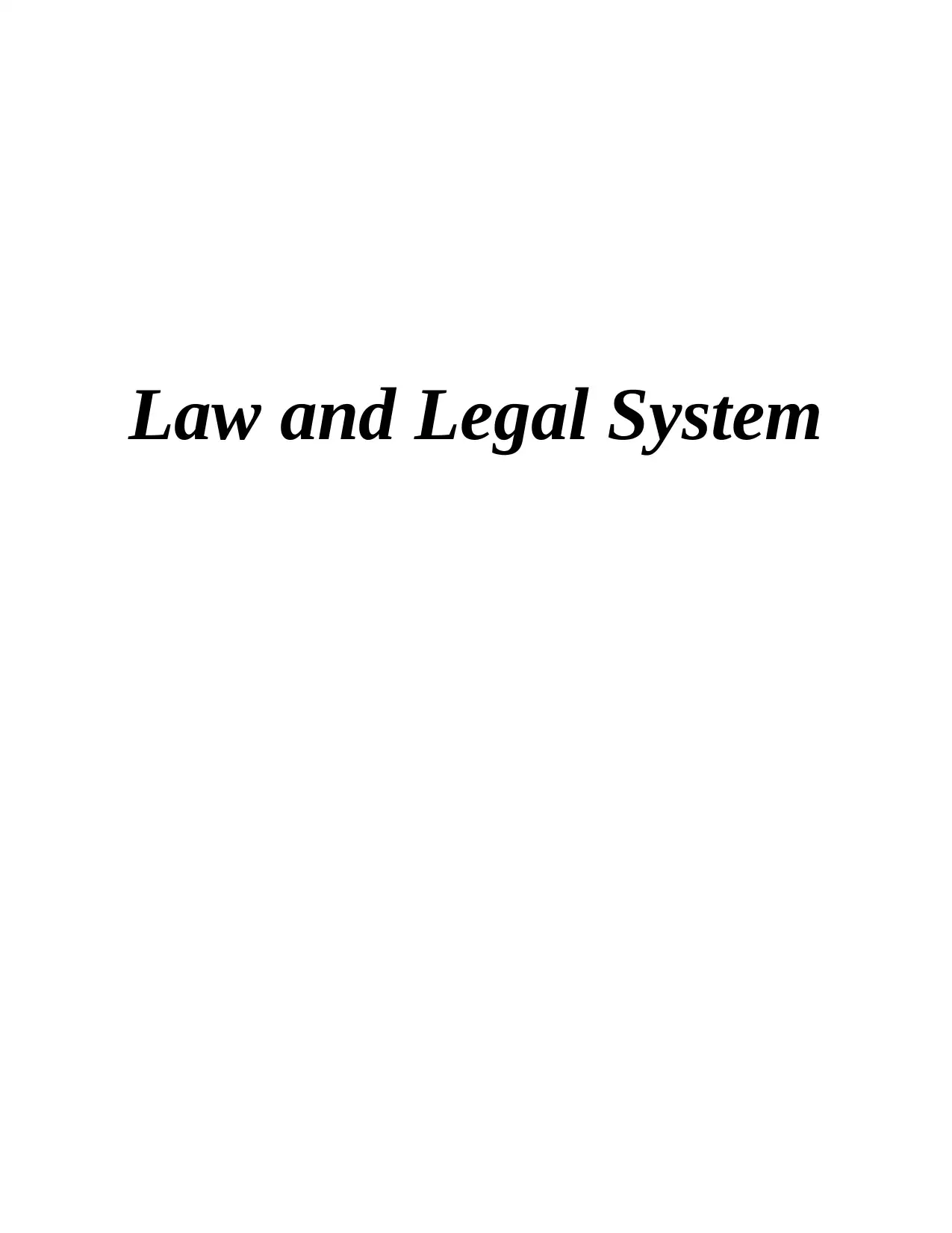
Law and Legal System
Paraphrase This Document
Need a fresh take? Get an instant paraphrase of this document with our AI Paraphraser

Table of Contents
INTRODUCTION...........................................................................................................................3
MAIN BODY..................................................................................................................................3
CONCLUSION................................................................................................................................8
REFERENCES................................................................................................................................9
INTRODUCTION...........................................................................................................................3
MAIN BODY..................................................................................................................................3
CONCLUSION................................................................................................................................8
REFERENCES................................................................................................................................9
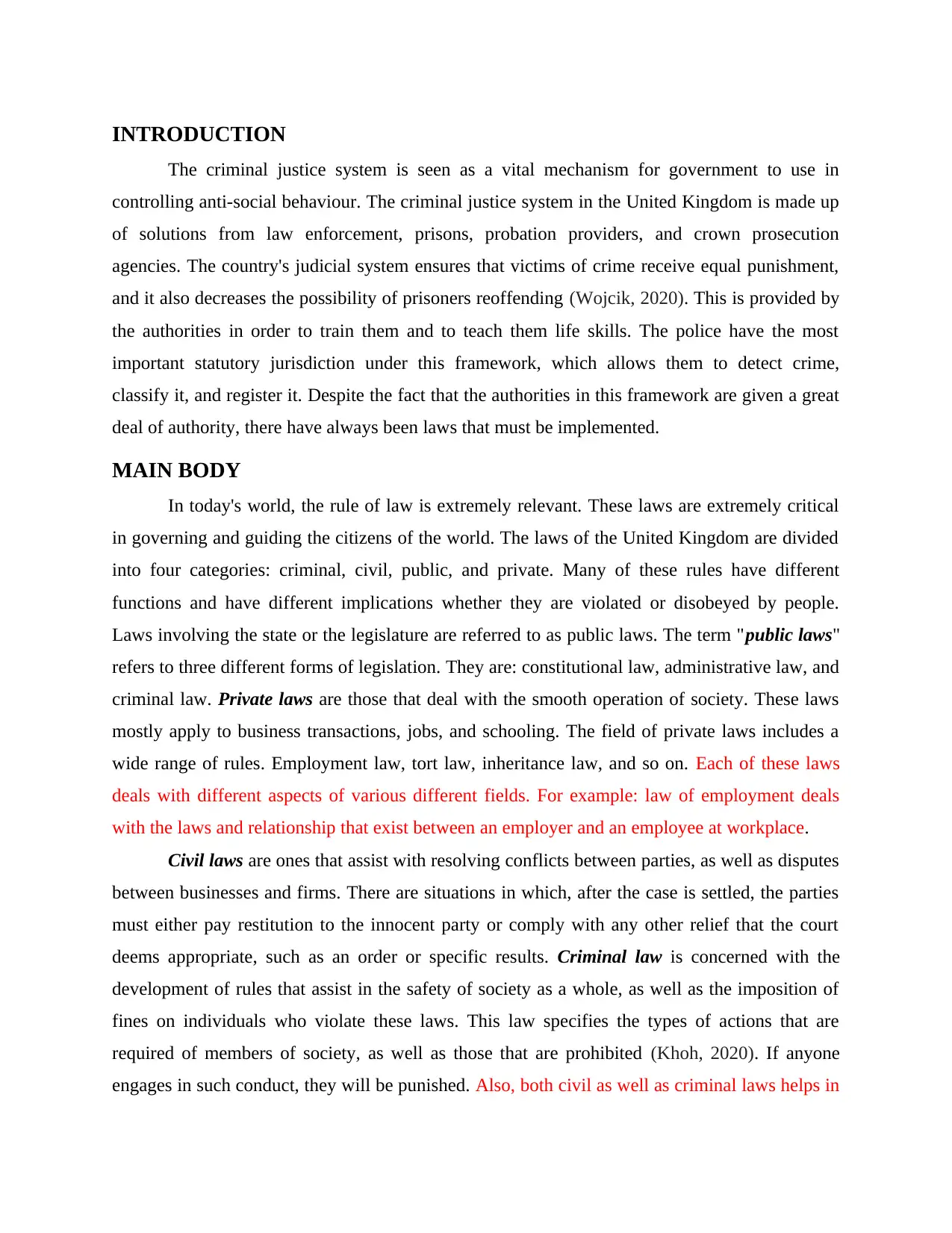
INTRODUCTION
The criminal justice system is seen as a vital mechanism for government to use in
controlling anti-social behaviour. The criminal justice system in the United Kingdom is made up
of solutions from law enforcement, prisons, probation providers, and crown prosecution
agencies. The country's judicial system ensures that victims of crime receive equal punishment,
and it also decreases the possibility of prisoners reoffending (Wojcik, 2020). This is provided by
the authorities in order to train them and to teach them life skills. The police have the most
important statutory jurisdiction under this framework, which allows them to detect crime,
classify it, and register it. Despite the fact that the authorities in this framework are given a great
deal of authority, there have always been laws that must be implemented.
MAIN BODY
In today's world, the rule of law is extremely relevant. These laws are extremely critical
in governing and guiding the citizens of the world. The laws of the United Kingdom are divided
into four categories: criminal, civil, public, and private. Many of these rules have different
functions and have different implications whether they are violated or disobeyed by people.
Laws involving the state or the legislature are referred to as public laws. The term "public laws"
refers to three different forms of legislation. They are: constitutional law, administrative law, and
criminal law. Private laws are those that deal with the smooth operation of society. These laws
mostly apply to business transactions, jobs, and schooling. The field of private laws includes a
wide range of rules. Employment law, tort law, inheritance law, and so on. Each of these laws
deals with different aspects of various different fields. For example: law of employment deals
with the laws and relationship that exist between an employer and an employee at workplace.
Civil laws are ones that assist with resolving conflicts between parties, as well as disputes
between businesses and firms. There are situations in which, after the case is settled, the parties
must either pay restitution to the innocent party or comply with any other relief that the court
deems appropriate, such as an order or specific results. Criminal law is concerned with the
development of rules that assist in the safety of society as a whole, as well as the imposition of
fines on individuals who violate these laws. This law specifies the types of actions that are
required of members of society, as well as those that are prohibited (Khoh, 2020). If anyone
engages in such conduct, they will be punished. Also, both civil as well as criminal laws helps in
The criminal justice system is seen as a vital mechanism for government to use in
controlling anti-social behaviour. The criminal justice system in the United Kingdom is made up
of solutions from law enforcement, prisons, probation providers, and crown prosecution
agencies. The country's judicial system ensures that victims of crime receive equal punishment,
and it also decreases the possibility of prisoners reoffending (Wojcik, 2020). This is provided by
the authorities in order to train them and to teach them life skills. The police have the most
important statutory jurisdiction under this framework, which allows them to detect crime,
classify it, and register it. Despite the fact that the authorities in this framework are given a great
deal of authority, there have always been laws that must be implemented.
MAIN BODY
In today's world, the rule of law is extremely relevant. These laws are extremely critical
in governing and guiding the citizens of the world. The laws of the United Kingdom are divided
into four categories: criminal, civil, public, and private. Many of these rules have different
functions and have different implications whether they are violated or disobeyed by people.
Laws involving the state or the legislature are referred to as public laws. The term "public laws"
refers to three different forms of legislation. They are: constitutional law, administrative law, and
criminal law. Private laws are those that deal with the smooth operation of society. These laws
mostly apply to business transactions, jobs, and schooling. The field of private laws includes a
wide range of rules. Employment law, tort law, inheritance law, and so on. Each of these laws
deals with different aspects of various different fields. For example: law of employment deals
with the laws and relationship that exist between an employer and an employee at workplace.
Civil laws are ones that assist with resolving conflicts between parties, as well as disputes
between businesses and firms. There are situations in which, after the case is settled, the parties
must either pay restitution to the innocent party or comply with any other relief that the court
deems appropriate, such as an order or specific results. Criminal law is concerned with the
development of rules that assist in the safety of society as a whole, as well as the imposition of
fines on individuals who violate these laws. This law specifies the types of actions that are
required of members of society, as well as those that are prohibited (Khoh, 2020). If anyone
engages in such conduct, they will be punished. Also, both civil as well as criminal laws helps in
⊘ This is a preview!⊘
Do you want full access?
Subscribe today to unlock all pages.

Trusted by 1+ million students worldwide
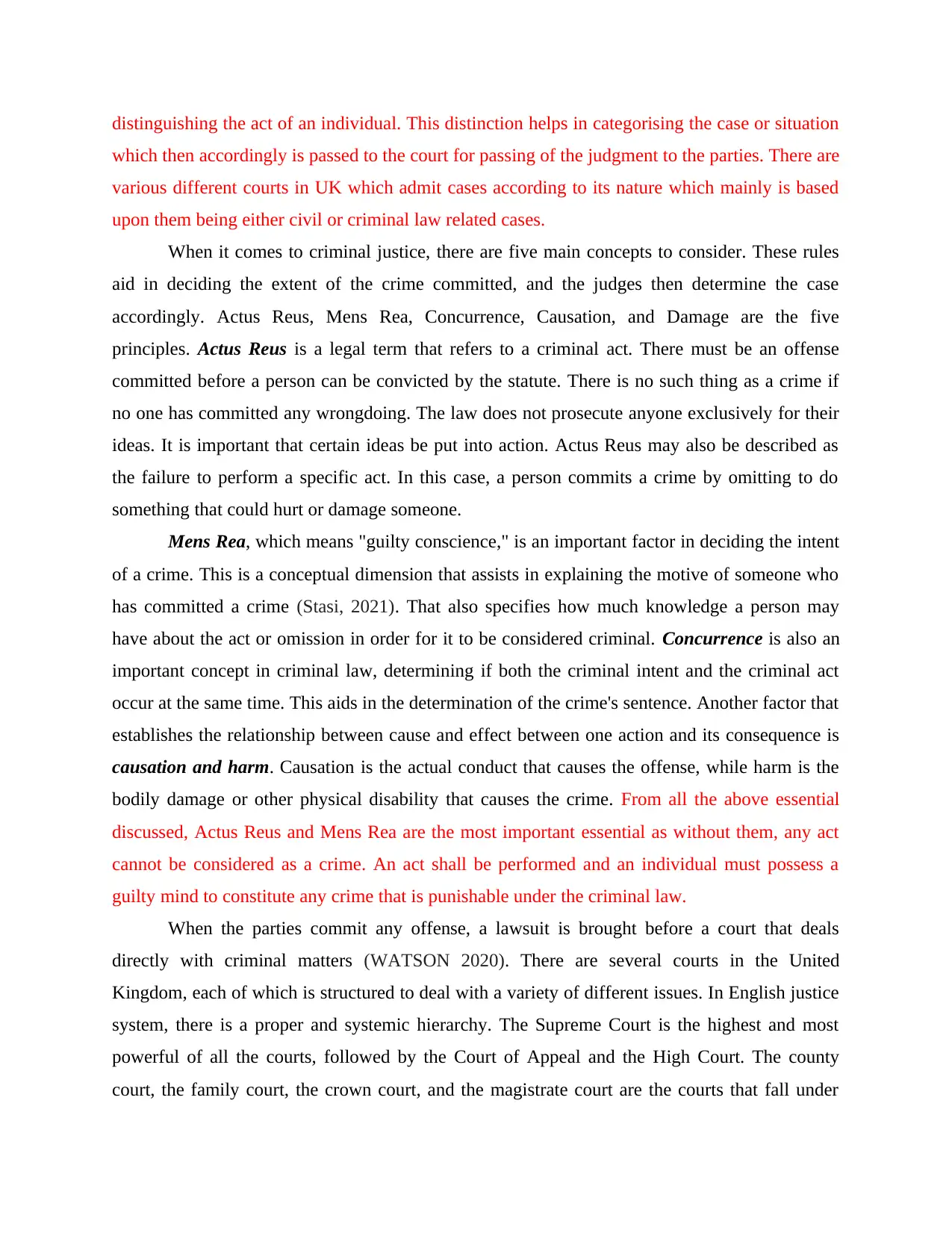
distinguishing the act of an individual. This distinction helps in categorising the case or situation
which then accordingly is passed to the court for passing of the judgment to the parties. There are
various different courts in UK which admit cases according to its nature which mainly is based
upon them being either civil or criminal law related cases.
When it comes to criminal justice, there are five main concepts to consider. These rules
aid in deciding the extent of the crime committed, and the judges then determine the case
accordingly. Actus Reus, Mens Rea, Concurrence, Causation, and Damage are the five
principles. Actus Reus is a legal term that refers to a criminal act. There must be an offense
committed before a person can be convicted by the statute. There is no such thing as a crime if
no one has committed any wrongdoing. The law does not prosecute anyone exclusively for their
ideas. It is important that certain ideas be put into action. Actus Reus may also be described as
the failure to perform a specific act. In this case, a person commits a crime by omitting to do
something that could hurt or damage someone.
Mens Rea, which means "guilty conscience," is an important factor in deciding the intent
of a crime. This is a conceptual dimension that assists in explaining the motive of someone who
has committed a crime (Stasi, 2021). That also specifies how much knowledge a person may
have about the act or omission in order for it to be considered criminal. Concurrence is also an
important concept in criminal law, determining if both the criminal intent and the criminal act
occur at the same time. This aids in the determination of the crime's sentence. Another factor that
establishes the relationship between cause and effect between one action and its consequence is
causation and harm. Causation is the actual conduct that causes the offense, while harm is the
bodily damage or other physical disability that causes the crime. From all the above essential
discussed, Actus Reus and Mens Rea are the most important essential as without them, any act
cannot be considered as a crime. An act shall be performed and an individual must possess a
guilty mind to constitute any crime that is punishable under the criminal law.
When the parties commit any offense, a lawsuit is brought before a court that deals
directly with criminal matters (WATSON 2020). There are several courts in the United
Kingdom, each of which is structured to deal with a variety of different issues. In English justice
system, there is a proper and systemic hierarchy. The Supreme Court is the highest and most
powerful of all the courts, followed by the Court of Appeal and the High Court. The county
court, the family court, the crown court, and the magistrate court are the courts that fall under
which then accordingly is passed to the court for passing of the judgment to the parties. There are
various different courts in UK which admit cases according to its nature which mainly is based
upon them being either civil or criminal law related cases.
When it comes to criminal justice, there are five main concepts to consider. These rules
aid in deciding the extent of the crime committed, and the judges then determine the case
accordingly. Actus Reus, Mens Rea, Concurrence, Causation, and Damage are the five
principles. Actus Reus is a legal term that refers to a criminal act. There must be an offense
committed before a person can be convicted by the statute. There is no such thing as a crime if
no one has committed any wrongdoing. The law does not prosecute anyone exclusively for their
ideas. It is important that certain ideas be put into action. Actus Reus may also be described as
the failure to perform a specific act. In this case, a person commits a crime by omitting to do
something that could hurt or damage someone.
Mens Rea, which means "guilty conscience," is an important factor in deciding the intent
of a crime. This is a conceptual dimension that assists in explaining the motive of someone who
has committed a crime (Stasi, 2021). That also specifies how much knowledge a person may
have about the act or omission in order for it to be considered criminal. Concurrence is also an
important concept in criminal law, determining if both the criminal intent and the criminal act
occur at the same time. This aids in the determination of the crime's sentence. Another factor that
establishes the relationship between cause and effect between one action and its consequence is
causation and harm. Causation is the actual conduct that causes the offense, while harm is the
bodily damage or other physical disability that causes the crime. From all the above essential
discussed, Actus Reus and Mens Rea are the most important essential as without them, any act
cannot be considered as a crime. An act shall be performed and an individual must possess a
guilty mind to constitute any crime that is punishable under the criminal law.
When the parties commit any offense, a lawsuit is brought before a court that deals
directly with criminal matters (WATSON 2020). There are several courts in the United
Kingdom, each of which is structured to deal with a variety of different issues. In English justice
system, there is a proper and systemic hierarchy. The Supreme Court is the highest and most
powerful of all the courts, followed by the Court of Appeal and the High Court. The county
court, the family court, the crown court, and the magistrate court are the courts that fall under
Paraphrase This Document
Need a fresh take? Get an instant paraphrase of this document with our AI Paraphraser
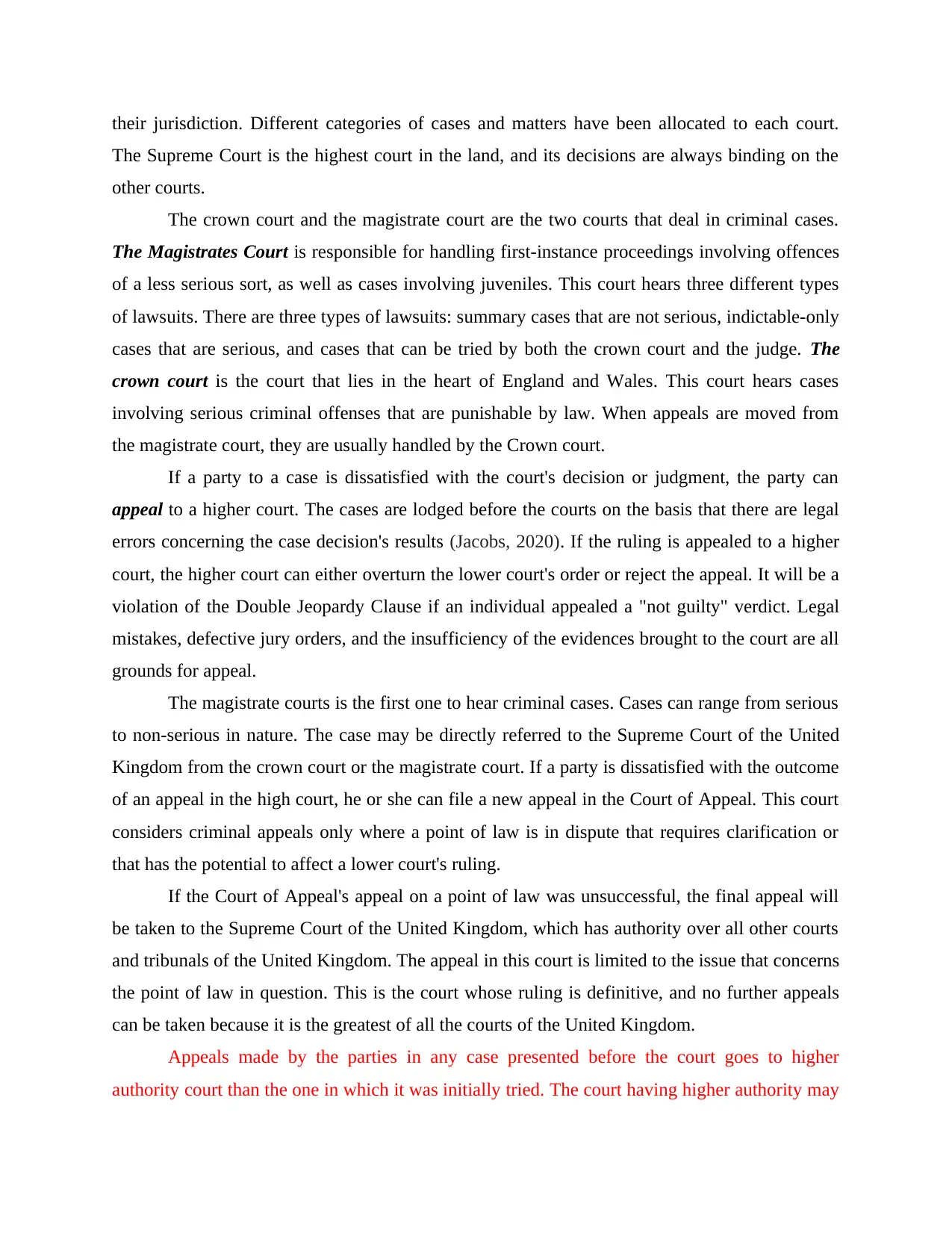
their jurisdiction. Different categories of cases and matters have been allocated to each court.
The Supreme Court is the highest court in the land, and its decisions are always binding on the
other courts.
The crown court and the magistrate court are the two courts that deal in criminal cases.
The Magistrates Court is responsible for handling first-instance proceedings involving offences
of a less serious sort, as well as cases involving juveniles. This court hears three different types
of lawsuits. There are three types of lawsuits: summary cases that are not serious, indictable-only
cases that are serious, and cases that can be tried by both the crown court and the judge. The
crown court is the court that lies in the heart of England and Wales. This court hears cases
involving serious criminal offenses that are punishable by law. When appeals are moved from
the magistrate court, they are usually handled by the Crown court.
If a party to a case is dissatisfied with the court's decision or judgment, the party can
appeal to a higher court. The cases are lodged before the courts on the basis that there are legal
errors concerning the case decision's results (Jacobs, 2020). If the ruling is appealed to a higher
court, the higher court can either overturn the lower court's order or reject the appeal. It will be a
violation of the Double Jeopardy Clause if an individual appealed a "not guilty" verdict. Legal
mistakes, defective jury orders, and the insufficiency of the evidences brought to the court are all
grounds for appeal.
The magistrate courts is the first one to hear criminal cases. Cases can range from serious
to non-serious in nature. The case may be directly referred to the Supreme Court of the United
Kingdom from the crown court or the magistrate court. If a party is dissatisfied with the outcome
of an appeal in the high court, he or she can file a new appeal in the Court of Appeal. This court
considers criminal appeals only where a point of law is in dispute that requires clarification or
that has the potential to affect a lower court's ruling.
If the Court of Appeal's appeal on a point of law was unsuccessful, the final appeal will
be taken to the Supreme Court of the United Kingdom, which has authority over all other courts
and tribunals of the United Kingdom. The appeal in this court is limited to the issue that concerns
the point of law in question. This is the court whose ruling is definitive, and no further appeals
can be taken because it is the greatest of all the courts of the United Kingdom.
Appeals made by the parties in any case presented before the court goes to higher
authority court than the one in which it was initially tried. The court having higher authority may
The Supreme Court is the highest court in the land, and its decisions are always binding on the
other courts.
The crown court and the magistrate court are the two courts that deal in criminal cases.
The Magistrates Court is responsible for handling first-instance proceedings involving offences
of a less serious sort, as well as cases involving juveniles. This court hears three different types
of lawsuits. There are three types of lawsuits: summary cases that are not serious, indictable-only
cases that are serious, and cases that can be tried by both the crown court and the judge. The
crown court is the court that lies in the heart of England and Wales. This court hears cases
involving serious criminal offenses that are punishable by law. When appeals are moved from
the magistrate court, they are usually handled by the Crown court.
If a party to a case is dissatisfied with the court's decision or judgment, the party can
appeal to a higher court. The cases are lodged before the courts on the basis that there are legal
errors concerning the case decision's results (Jacobs, 2020). If the ruling is appealed to a higher
court, the higher court can either overturn the lower court's order or reject the appeal. It will be a
violation of the Double Jeopardy Clause if an individual appealed a "not guilty" verdict. Legal
mistakes, defective jury orders, and the insufficiency of the evidences brought to the court are all
grounds for appeal.
The magistrate courts is the first one to hear criminal cases. Cases can range from serious
to non-serious in nature. The case may be directly referred to the Supreme Court of the United
Kingdom from the crown court or the magistrate court. If a party is dissatisfied with the outcome
of an appeal in the high court, he or she can file a new appeal in the Court of Appeal. This court
considers criminal appeals only where a point of law is in dispute that requires clarification or
that has the potential to affect a lower court's ruling.
If the Court of Appeal's appeal on a point of law was unsuccessful, the final appeal will
be taken to the Supreme Court of the United Kingdom, which has authority over all other courts
and tribunals of the United Kingdom. The appeal in this court is limited to the issue that concerns
the point of law in question. This is the court whose ruling is definitive, and no further appeals
can be taken because it is the greatest of all the courts of the United Kingdom.
Appeals made by the parties in any case presented before the court goes to higher
authority court than the one in which it was initially tried. The court having higher authority may
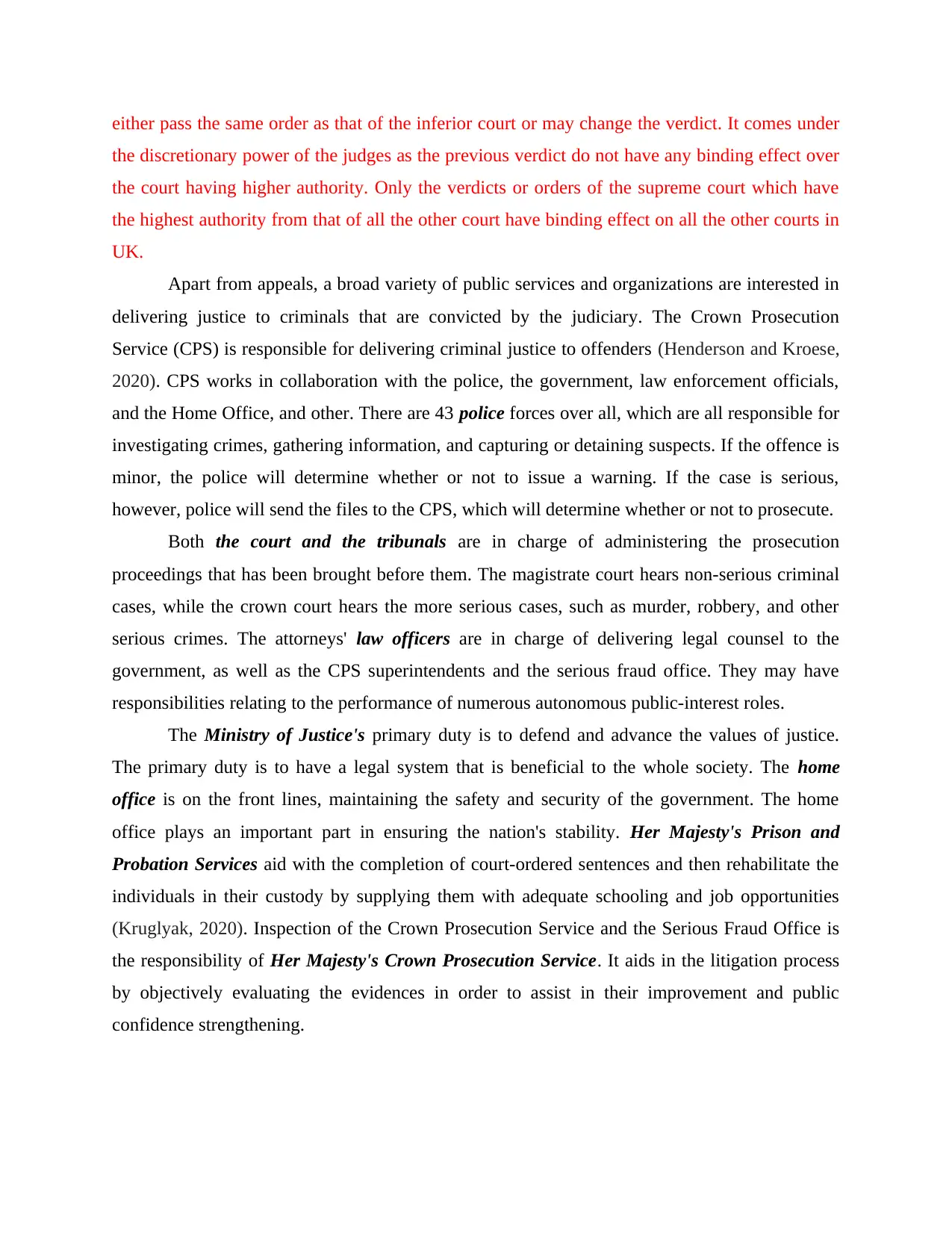
either pass the same order as that of the inferior court or may change the verdict. It comes under
the discretionary power of the judges as the previous verdict do not have any binding effect over
the court having higher authority. Only the verdicts or orders of the supreme court which have
the highest authority from that of all the other court have binding effect on all the other courts in
UK.
Apart from appeals, a broad variety of public services and organizations are interested in
delivering justice to criminals that are convicted by the judiciary. The Crown Prosecution
Service (CPS) is responsible for delivering criminal justice to offenders (Henderson and Kroese,
2020). CPS works in collaboration with the police, the government, law enforcement officials,
and the Home Office, and other. There are 43 police forces over all, which are all responsible for
investigating crimes, gathering information, and capturing or detaining suspects. If the offence is
minor, the police will determine whether or not to issue a warning. If the case is serious,
however, police will send the files to the CPS, which will determine whether or not to prosecute.
Both the court and the tribunals are in charge of administering the prosecution
proceedings that has been brought before them. The magistrate court hears non-serious criminal
cases, while the crown court hears the more serious cases, such as murder, robbery, and other
serious crimes. The attorneys' law officers are in charge of delivering legal counsel to the
government, as well as the CPS superintendents and the serious fraud office. They may have
responsibilities relating to the performance of numerous autonomous public-interest roles.
The Ministry of Justice's primary duty is to defend and advance the values of justice.
The primary duty is to have a legal system that is beneficial to the whole society. The home
office is on the front lines, maintaining the safety and security of the government. The home
office plays an important part in ensuring the nation's stability. Her Majesty's Prison and
Probation Services aid with the completion of court-ordered sentences and then rehabilitate the
individuals in their custody by supplying them with adequate schooling and job opportunities
(Kruglyak, 2020). Inspection of the Crown Prosecution Service and the Serious Fraud Office is
the responsibility of Her Majesty's Crown Prosecution Service. It aids in the litigation process
by objectively evaluating the evidences in order to assist in their improvement and public
confidence strengthening.
the discretionary power of the judges as the previous verdict do not have any binding effect over
the court having higher authority. Only the verdicts or orders of the supreme court which have
the highest authority from that of all the other court have binding effect on all the other courts in
UK.
Apart from appeals, a broad variety of public services and organizations are interested in
delivering justice to criminals that are convicted by the judiciary. The Crown Prosecution
Service (CPS) is responsible for delivering criminal justice to offenders (Henderson and Kroese,
2020). CPS works in collaboration with the police, the government, law enforcement officials,
and the Home Office, and other. There are 43 police forces over all, which are all responsible for
investigating crimes, gathering information, and capturing or detaining suspects. If the offence is
minor, the police will determine whether or not to issue a warning. If the case is serious,
however, police will send the files to the CPS, which will determine whether or not to prosecute.
Both the court and the tribunals are in charge of administering the prosecution
proceedings that has been brought before them. The magistrate court hears non-serious criminal
cases, while the crown court hears the more serious cases, such as murder, robbery, and other
serious crimes. The attorneys' law officers are in charge of delivering legal counsel to the
government, as well as the CPS superintendents and the serious fraud office. They may have
responsibilities relating to the performance of numerous autonomous public-interest roles.
The Ministry of Justice's primary duty is to defend and advance the values of justice.
The primary duty is to have a legal system that is beneficial to the whole society. The home
office is on the front lines, maintaining the safety and security of the government. The home
office plays an important part in ensuring the nation's stability. Her Majesty's Prison and
Probation Services aid with the completion of court-ordered sentences and then rehabilitate the
individuals in their custody by supplying them with adequate schooling and job opportunities
(Kruglyak, 2020). Inspection of the Crown Prosecution Service and the Serious Fraud Office is
the responsibility of Her Majesty's Crown Prosecution Service. It aids in the litigation process
by objectively evaluating the evidences in order to assist in their improvement and public
confidence strengthening.
⊘ This is a preview!⊘
Do you want full access?
Subscribe today to unlock all pages.

Trusted by 1+ million students worldwide
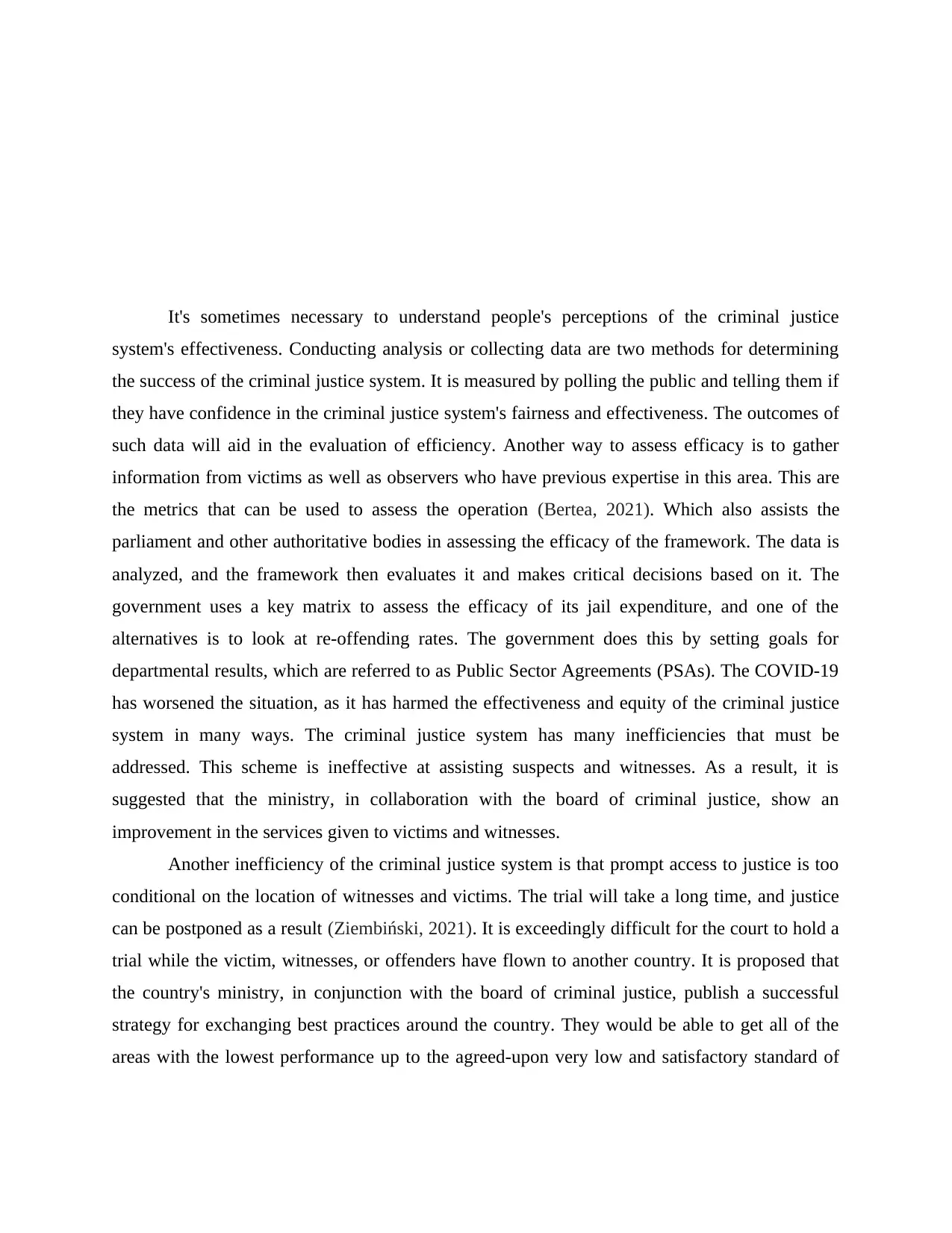
It's sometimes necessary to understand people's perceptions of the criminal justice
system's effectiveness. Conducting analysis or collecting data are two methods for determining
the success of the criminal justice system. It is measured by polling the public and telling them if
they have confidence in the criminal justice system's fairness and effectiveness. The outcomes of
such data will aid in the evaluation of efficiency. Another way to assess efficacy is to gather
information from victims as well as observers who have previous expertise in this area. This are
the metrics that can be used to assess the operation (Bertea, 2021). Which also assists the
parliament and other authoritative bodies in assessing the efficacy of the framework. The data is
analyzed, and the framework then evaluates it and makes critical decisions based on it. The
government uses a key matrix to assess the efficacy of its jail expenditure, and one of the
alternatives is to look at re-offending rates. The government does this by setting goals for
departmental results, which are referred to as Public Sector Agreements (PSAs). The COVID-19
has worsened the situation, as it has harmed the effectiveness and equity of the criminal justice
system in many ways. The criminal justice system has many inefficiencies that must be
addressed. This scheme is ineffective at assisting suspects and witnesses. As a result, it is
suggested that the ministry, in collaboration with the board of criminal justice, show an
improvement in the services given to victims and witnesses.
Another inefficiency of the criminal justice system is that prompt access to justice is too
conditional on the location of witnesses and victims. The trial will take a long time, and justice
can be postponed as a result (Ziembiński, 2021) . It is exceedingly difficult for the court to hold a
trial while the victim, witnesses, or offenders have flown to another country. It is proposed that
the country's ministry, in conjunction with the board of criminal justice, publish a successful
strategy for exchanging best practices around the country. They would be able to get all of the
areas with the lowest performance up to the agreed-upon very low and satisfactory standard of
system's effectiveness. Conducting analysis or collecting data are two methods for determining
the success of the criminal justice system. It is measured by polling the public and telling them if
they have confidence in the criminal justice system's fairness and effectiveness. The outcomes of
such data will aid in the evaluation of efficiency. Another way to assess efficacy is to gather
information from victims as well as observers who have previous expertise in this area. This are
the metrics that can be used to assess the operation (Bertea, 2021). Which also assists the
parliament and other authoritative bodies in assessing the efficacy of the framework. The data is
analyzed, and the framework then evaluates it and makes critical decisions based on it. The
government uses a key matrix to assess the efficacy of its jail expenditure, and one of the
alternatives is to look at re-offending rates. The government does this by setting goals for
departmental results, which are referred to as Public Sector Agreements (PSAs). The COVID-19
has worsened the situation, as it has harmed the effectiveness and equity of the criminal justice
system in many ways. The criminal justice system has many inefficiencies that must be
addressed. This scheme is ineffective at assisting suspects and witnesses. As a result, it is
suggested that the ministry, in collaboration with the board of criminal justice, show an
improvement in the services given to victims and witnesses.
Another inefficiency of the criminal justice system is that prompt access to justice is too
conditional on the location of witnesses and victims. The trial will take a long time, and justice
can be postponed as a result (Ziembiński, 2021) . It is exceedingly difficult for the court to hold a
trial while the victim, witnesses, or offenders have flown to another country. It is proposed that
the country's ministry, in conjunction with the board of criminal justice, publish a successful
strategy for exchanging best practices around the country. They would be able to get all of the
areas with the lowest performance up to the agreed-upon very low and satisfactory standard of
Paraphrase This Document
Need a fresh take? Get an instant paraphrase of this document with our AI Paraphraser
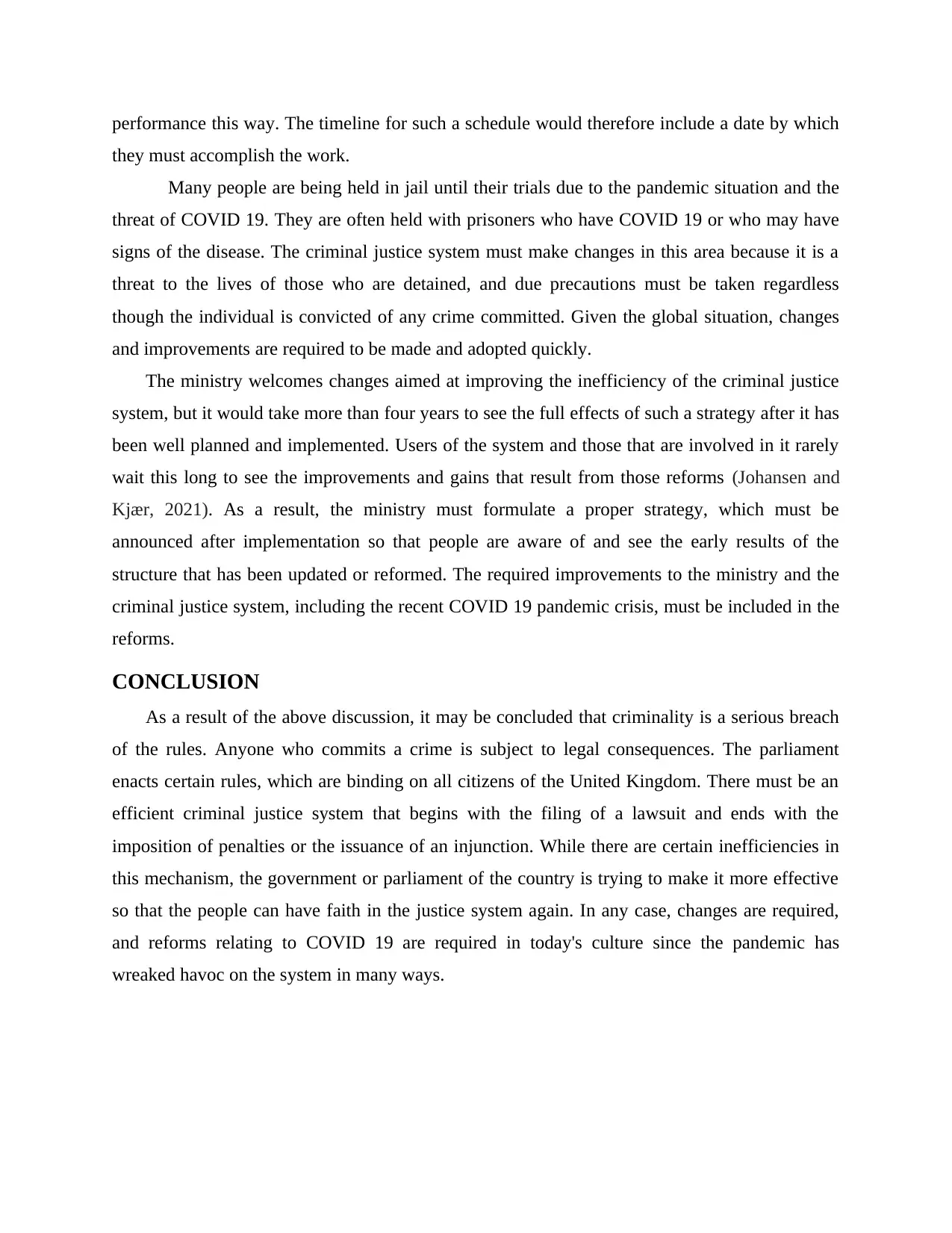
performance this way. The timeline for such a schedule would therefore include a date by which
they must accomplish the work.
Many people are being held in jail until their trials due to the pandemic situation and the
threat of COVID 19. They are often held with prisoners who have COVID 19 or who may have
signs of the disease. The criminal justice system must make changes in this area because it is a
threat to the lives of those who are detained, and due precautions must be taken regardless
though the individual is convicted of any crime committed. Given the global situation, changes
and improvements are required to be made and adopted quickly.
The ministry welcomes changes aimed at improving the inefficiency of the criminal justice
system, but it would take more than four years to see the full effects of such a strategy after it has
been well planned and implemented. Users of the system and those that are involved in it rarely
wait this long to see the improvements and gains that result from those reforms (Johansen and
Kjær, 2021). As a result, the ministry must formulate a proper strategy, which must be
announced after implementation so that people are aware of and see the early results of the
structure that has been updated or reformed. The required improvements to the ministry and the
criminal justice system, including the recent COVID 19 pandemic crisis, must be included in the
reforms.
CONCLUSION
As a result of the above discussion, it may be concluded that criminality is a serious breach
of the rules. Anyone who commits a crime is subject to legal consequences. The parliament
enacts certain rules, which are binding on all citizens of the United Kingdom. There must be an
efficient criminal justice system that begins with the filing of a lawsuit and ends with the
imposition of penalties or the issuance of an injunction. While there are certain inefficiencies in
this mechanism, the government or parliament of the country is trying to make it more effective
so that the people can have faith in the justice system again. In any case, changes are required,
and reforms relating to COVID 19 are required in today's culture since the pandemic has
wreaked havoc on the system in many ways.
they must accomplish the work.
Many people are being held in jail until their trials due to the pandemic situation and the
threat of COVID 19. They are often held with prisoners who have COVID 19 or who may have
signs of the disease. The criminal justice system must make changes in this area because it is a
threat to the lives of those who are detained, and due precautions must be taken regardless
though the individual is convicted of any crime committed. Given the global situation, changes
and improvements are required to be made and adopted quickly.
The ministry welcomes changes aimed at improving the inefficiency of the criminal justice
system, but it would take more than four years to see the full effects of such a strategy after it has
been well planned and implemented. Users of the system and those that are involved in it rarely
wait this long to see the improvements and gains that result from those reforms (Johansen and
Kjær, 2021). As a result, the ministry must formulate a proper strategy, which must be
announced after implementation so that people are aware of and see the early results of the
structure that has been updated or reformed. The required improvements to the ministry and the
criminal justice system, including the recent COVID 19 pandemic crisis, must be included in the
reforms.
CONCLUSION
As a result of the above discussion, it may be concluded that criminality is a serious breach
of the rules. Anyone who commits a crime is subject to legal consequences. The parliament
enacts certain rules, which are binding on all citizens of the United Kingdom. There must be an
efficient criminal justice system that begins with the filing of a lawsuit and ends with the
imposition of penalties or the issuance of an injunction. While there are certain inefficiencies in
this mechanism, the government or parliament of the country is trying to make it more effective
so that the people can have faith in the justice system again. In any case, changes are required,
and reforms relating to COVID 19 are required in today's culture since the pandemic has
wreaked havoc on the system in many ways.
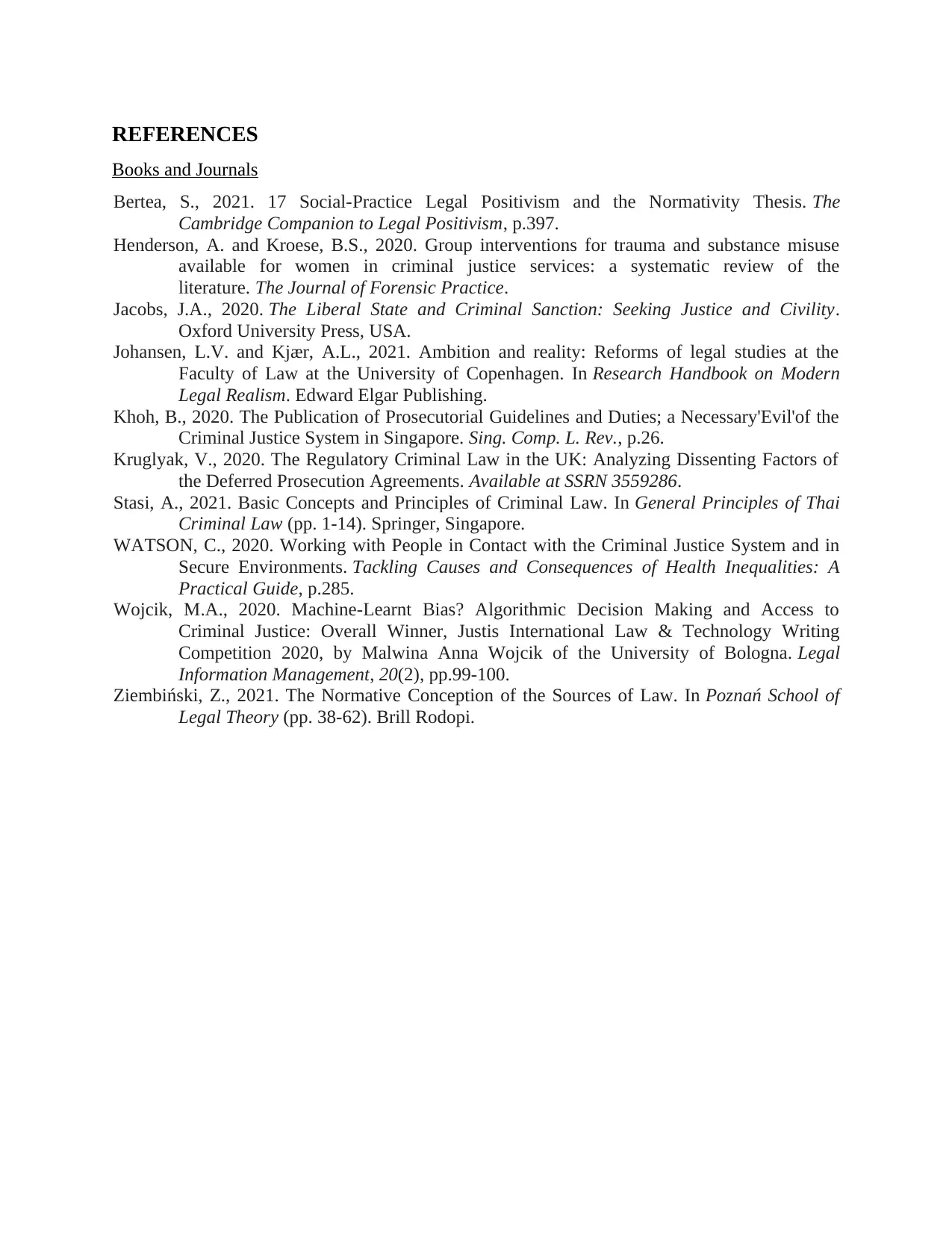
REFERENCES
Books and Journals
Bertea, S., 2021. 17 Social-Practice Legal Positivism and the Normativity Thesis. The
Cambridge Companion to Legal Positivism, p.397.
Henderson, A. and Kroese, B.S., 2020. Group interventions for trauma and substance misuse
available for women in criminal justice services: a systematic review of the
literature. The Journal of Forensic Practice.
Jacobs, J.A., 2020. The Liberal State and Criminal Sanction: Seeking Justice and Civility.
Oxford University Press, USA.
Johansen, L.V. and Kjær, A.L., 2021. Ambition and reality: Reforms of legal studies at the
Faculty of Law at the University of Copenhagen. In Research Handbook on Modern
Legal Realism. Edward Elgar Publishing.
Khoh, B., 2020. The Publication of Prosecutorial Guidelines and Duties; a Necessary'Evil'of the
Criminal Justice System in Singapore. Sing. Comp. L. Rev., p.26.
Kruglyak, V., 2020. The Regulatory Criminal Law in the UK: Analyzing Dissenting Factors of
the Deferred Prosecution Agreements. Available at SSRN 3559286.
Stasi, A., 2021. Basic Concepts and Principles of Criminal Law. In General Principles of Thai
Criminal Law (pp. 1-14). Springer, Singapore.
WATSON, C., 2020. Working with People in Contact with the Criminal Justice System and in
Secure Environments. Tackling Causes and Consequences of Health Inequalities: A
Practical Guide, p.285.
Wojcik, M.A., 2020. Machine-Learnt Bias? Algorithmic Decision Making and Access to
Criminal Justice: Overall Winner, Justis International Law & Technology Writing
Competition 2020, by Malwina Anna Wojcik of the University of Bologna. Legal
Information Management, 20(2), pp.99-100.
Ziembiński, Z., 2021. The Normative Conception of the Sources of Law. In Poznań School of
Legal Theory (pp. 38-62). Brill Rodopi.
Books and Journals
Bertea, S., 2021. 17 Social-Practice Legal Positivism and the Normativity Thesis. The
Cambridge Companion to Legal Positivism, p.397.
Henderson, A. and Kroese, B.S., 2020. Group interventions for trauma and substance misuse
available for women in criminal justice services: a systematic review of the
literature. The Journal of Forensic Practice.
Jacobs, J.A., 2020. The Liberal State and Criminal Sanction: Seeking Justice and Civility.
Oxford University Press, USA.
Johansen, L.V. and Kjær, A.L., 2021. Ambition and reality: Reforms of legal studies at the
Faculty of Law at the University of Copenhagen. In Research Handbook on Modern
Legal Realism. Edward Elgar Publishing.
Khoh, B., 2020. The Publication of Prosecutorial Guidelines and Duties; a Necessary'Evil'of the
Criminal Justice System in Singapore. Sing. Comp. L. Rev., p.26.
Kruglyak, V., 2020. The Regulatory Criminal Law in the UK: Analyzing Dissenting Factors of
the Deferred Prosecution Agreements. Available at SSRN 3559286.
Stasi, A., 2021. Basic Concepts and Principles of Criminal Law. In General Principles of Thai
Criminal Law (pp. 1-14). Springer, Singapore.
WATSON, C., 2020. Working with People in Contact with the Criminal Justice System and in
Secure Environments. Tackling Causes and Consequences of Health Inequalities: A
Practical Guide, p.285.
Wojcik, M.A., 2020. Machine-Learnt Bias? Algorithmic Decision Making and Access to
Criminal Justice: Overall Winner, Justis International Law & Technology Writing
Competition 2020, by Malwina Anna Wojcik of the University of Bologna. Legal
Information Management, 20(2), pp.99-100.
Ziembiński, Z., 2021. The Normative Conception of the Sources of Law. In Poznań School of
Legal Theory (pp. 38-62). Brill Rodopi.
⊘ This is a preview!⊘
Do you want full access?
Subscribe today to unlock all pages.

Trusted by 1+ million students worldwide
1 out of 9
Related Documents
Your All-in-One AI-Powered Toolkit for Academic Success.
+13062052269
info@desklib.com
Available 24*7 on WhatsApp / Email
![[object Object]](/_next/static/media/star-bottom.7253800d.svg)
Unlock your academic potential
Copyright © 2020–2025 A2Z Services. All Rights Reserved. Developed and managed by ZUCOL.





